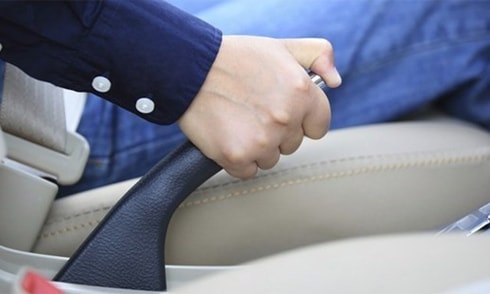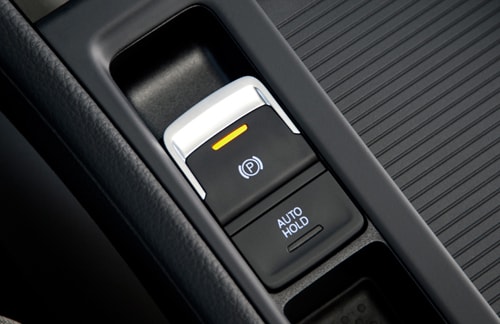Notes when using the handbrake
According to the operating mechanism, handbrakes are divided into mechanical brakes and electronic brakes, both of which encounter their own problems after a long period of use.
Unlike the foot brake, which is only used when the car is running, the hand brake is used when the car is at rest, its main purpose is to keep the car stationary, not rolling when stopping or parking. The hand brake is under less load than the foot brake, but it works for many hours, weeks, even months.
 |
Mechanical handbrake on car. |
In special cases, the handbrake is the last resort when the footbrake fails. However, it should be noted that it should only be used in case of force majeure. Because if you suddenly pull the handbrake while the car is running, the next event will be very difficult to control. The braking force is only on the 2 rear wheels, causing the wheel to slip, causing the car to spin. However, today's cars are modern, the footbrake usually has 2 hydraulic circuits, so it rarely fails. Every manufacturer knows how important the brake is to the safety of the user.
With older models of cars, using manual transmission and less technology, the handbrake also plays a role in helping the car start on a slope - a skill taught at driving schools in Vietnam.
The most common handbrake is the handle type, usually located between the driver and passenger seats. Sometimes, it is found on the left side of the driver's seat. In addition, there are two other types of handbrakes: push button and pedal for automatic cars. However, in terms of the method of actuation/control, they are only divided into mechanical brakes and electronic brakes.
The mechanical handbrake works by pulling a cable connected to the 2 rear wheels, a crank converts the force pulling the cable into the force pressing the brake shoes against the drum. If the rear wheel uses disc brakes, the handbrake often takes advantage of this mechanism to operate.
Mechanical brakes often encounter the problem of pulling the brake but not working. Pulling the brake hard while moving slowly but the car does not stop. The cause may be that the brake mechanism is worn out, there is grease on the contact area or the brake clearance is adjusted too large.
The second common problem is the opposite, the brakes are stuck, release the handbrake but the wheels are still locked. Intentionally continuing to drive will cause the brakes to lose power, damage the ABS (for vehicles with disc brakes) due to overheating. There are many causes, it can be a cable jam due to dry grease, loose pins and pull rods. Or the brake shoe return spring is broken, causing the brake pads to always contact the drum (touching the drum feels hot).
 |
Electronic handbrake with the letter P (Parking). |
The electronic age makes everything easier. Handbrakes are no exception. Electronic handbrake systems have become popular in recent years, especially in luxury cars. The new technology solves the disadvantages of traditional handbrakes, such as being compact thanks to the elimination of the cable-driven type, being safer due to automatic activation to keep the car from sliding downhill, or automatically releasing the brake when the car is moving.
They mounted a DC motor actuator on the rear brake calipers. The EPB (Electronic Parking Brake) control box will process the signals received from the driver and the vehicle status, then transmit them to the electric motor to operate.
Like any other electronic system, EPB is prone to problems with wiring, the circuit between the EPB switch and the control unit, and the execution device being short-circuited or open-circuited. When there is a problem, the brake system warning light will appear on the dashboard. The user needs to bring the vehicle to a repair garage. The mechanic will use a specialized device to detect the error and proceed to restore or replace it.
According to VNE
| RELATED NEWS |
|---|

